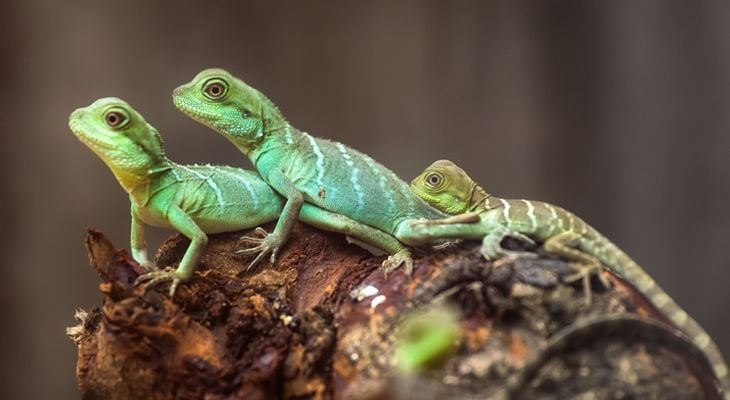Everyone knows they should have their females dogs and cats spayed, but what exactly does that mean? The word "spay" is thought to originate from the Old French espeer meaning to cut with a sword, which then may have been changed to the Middle English spayen. Today the word means to perform a surgery
Read more

People with limited living quarters may find that reptiles such as lizards or turtles fit perfectly into their lifestyles. Before deciding on a reptile, learn as much as possible about them and their needs. Poisonous snakes and certain reptiles should never be kept as pets. Ask your veterinarian about the suitability of a particular animal before you make your decision. There are many things to consider before committing to a reptile as a pet.
Finding out if a Pet is Legal Where You Live
Many areas have enacted laws pertaining to keeping reptiles. Some are general and some are quite specific; in many places any reptiles that are considered dangerous (venomous snakes, alligators, etc.) are illegal but some places are even more restrictive (for example, in some states all constricting snakes including ball pythons are illegal).
Salmonella Risks and Prevention
All reptile owners need to be informed about Salmonella infections. While the risks shouldn't keep most people from keeping reptiles since with the proper management the risks are minimal. Still, owners should be aware of the risks, and the US Centers for Disease Control recommends that certain risk groups should be careful about contact with reptiles and amphibians.
The Importance of Light and Heat
Many problems with keeping reptiles can be traced back to not providing the proper environmental conditions, particularly heat. Proper lighting is also important for many reptiles. The equipment to provide the proper heat and light to captive reptiles is often quite expensive, but is absolutely essential to keeping pet reptiles healthy. It is important to find out exactly what conditions your reptile needs and never cut corners when it comes to meeting those conditions!
Why Choose Captive Bred Reptiles
There are numerous reasons why you should pick a captive bred reptile if at all possible, as explained here.
How to Pick a Healthy Reptile
It is important to keep in mind that depending on where you get a reptile, it may be very stressed, dehydrated, and prone to illness. Here are some items to look for when buying your reptile to increase the chances of picking out a healthy pet reptile.
While there are many types of reptiles that could be good pets, here we cover a few you could consider.
-
What Is a Spay?
Category: Newsletter Library, Visiting the Vet
-
Veterinary Laser Therapy Eases A Pet’s Pain
Category: Newsletter Library, Visiting the Vet
Laser therapy is a cutting-edge technique in veterinary medicine for managing many conditions, including chronic pain in pets. Class IV (cold) laser therapy is especially effective for treating pets that struggle with osteoarthritis pain whether or not they have orthopedic surgery. Cold laser therapy
Read more -
Vaccine Reactions in Pets
Category: Newsletter Library, Visiting the Vet
Vaccines are intended to stimulate the immune system. In effect, they induce the response the immune system should have in the face of a real infection. They are like a fire drill for the immune system. As a result, our pets' bodies can have appropriate vaccine response symptoms as well as unexpected
Read more -
Saving On Pet Costs Doesn't Mean Reducing Care
Category: Newsletter Library, Visiting the Vet
Having a pet can cost owners hard earned money. There are food costs, recreation or pet-sitting costs, grooming fees and veterinary visits. When you want to save on the dollars you spend keeping your family's pets healthy and well remember that reducing their care is not the first choice to make.
Read more -
Questions to Ask When Considering Which Pet Health Insurance to Buy
Category: Newsletter Library, Visiting the Vet
We all love our pets and many consider their pets to be their furry children. When they get sick we want to be able to take care of them properly. With technological advances in veterinary medicine, much more is available now in both diagnostics and treatment. Procedures such as MRI's, CAT scans, chemotherapy,
Read more -
Preparing for Your Next Vet Visit
Category: Newsletter Library, Visiting the Vet
If you have ever returned home from a vet visit and realized that you forgot to ask an important question, you are not alone. It's easy to become distracted during the appointment, particularly if your pet is frightened or anxious. Preparation is the key to ensuring that all of your questions and concerns
Read more -
Planning for Your Dog's Health Care
Category: Newsletter Library, Visiting the Vet
Before adopting a dog, take a moment to consider the amount of care your pet will require and your ability to provide that care. Too often a cute face and wagging tail inspires individuals to bring home dogs without really considering the amount of time and financial resources required to raise healthy
Read more -
Pet Insurance Explained
Category: Newsletter Library, Visiting the Vet
As the amount of money spent on pet healthcare increases steadily at an estimated rate of 40% a year, and as pets become more like family, owners are looking to spend more on their pet's health. Pet owners also want to have their pets covered by insurance. Some basic plans start at $10 a month, while
Read more -
Pet Care During Tough Times
Category: Newsletter Library, Visiting the Vet
Studies have repeatedly shown that a large majority of pet owners consider their pets as a family member. We spoil them with birthday parties, presents, and all manner of toys and treats to keep them happy. But, when money is tight, extra expenses need to go. Sadly, some pet owners choose to avoid veterinary
Read more -
Lumps and Bumps: Routine Visits Pay Off
Category: Newsletter Library, Visiting the Vet
When was the last time your pet visited the veterinarian? If you answered "not in a while," it is time to book your next appointment. Have you recently discovered a lump or bump on your pet? Don't let that new discovery go unexamined. While it may be completely benign, it is essential for your pet's
Read more -
Feeling Apprehensive About Pet Treatment Involving Anesthesia?
Category: Newsletter Library, Visiting the Vet
Emergencies happen when we least expect it, and anesthesia could be a necessary component required to treat your pet. Treatment recommendations your veterinarian makes could also include dental care involving anesthesia. You may elect to neuter or spay your pet. Anesthesia will be required. Repair
Read more -
Don't Delay Pet Care While You Surf For Answers
Category: Newsletter Library, Visiting the Vet
The World Wide Web has opened up communication opportunities between veterinarians and pet owners. Convenient hand held devices allow pet owners with Web connections to scan, surf, text and email to their heart's content at any hour of the day. Or night. You might think this is convenient for pet
Read more -
Managing Food Allergies with an Elimination Diet
Category: Newsletter Library, Nutrition & Food
Food allergies are the third most common allergy that affects dogs and cats, outranked only by fleabites and inhaled allergens (e.g., pollen). Allergies to common food ingredients are also on the rise and now account for at least 30% of all allergy cases. Unfortunately for many pets, the most common
Read more -
Pet Food Safety Measures to Avoid Health Complications
Category: Newsletter Library, Nutrition & Food
Foods with inadequate nutrition, stored improperly or not handled safely can present problems for you and your pet. Making the right choices for the right pet will give your pet the best chance at optimum wellness. You'll have peace of mind and know your pet will receive the best health value possible.
Read more -
Pet Weight Critical to Wellness of Cats and Dogs
Category: Newsletter Library, Nutrition & Food
The Association of Pet Obesity Prevention advises that pets are suffering from epidemic obesity and it is preventable. Obese or overweight animals weigh in at nearly sixty-percent for cats and nearly fifty-percent for dogs. The number is constantly increasing and causing health conditions and physical
Read more -
Why Pet Nutrition Matters
Category: Newsletter Library, Nutrition & Food
With more than half of all dogs and cats overweight or obese, pets are increasingly at risk for a number of chronic health problems, according to the American Animal Hospital Association (AAHA). An appropriate, balanced diet can make a significant difference for a pet’s overall health, reducing the
Read more
